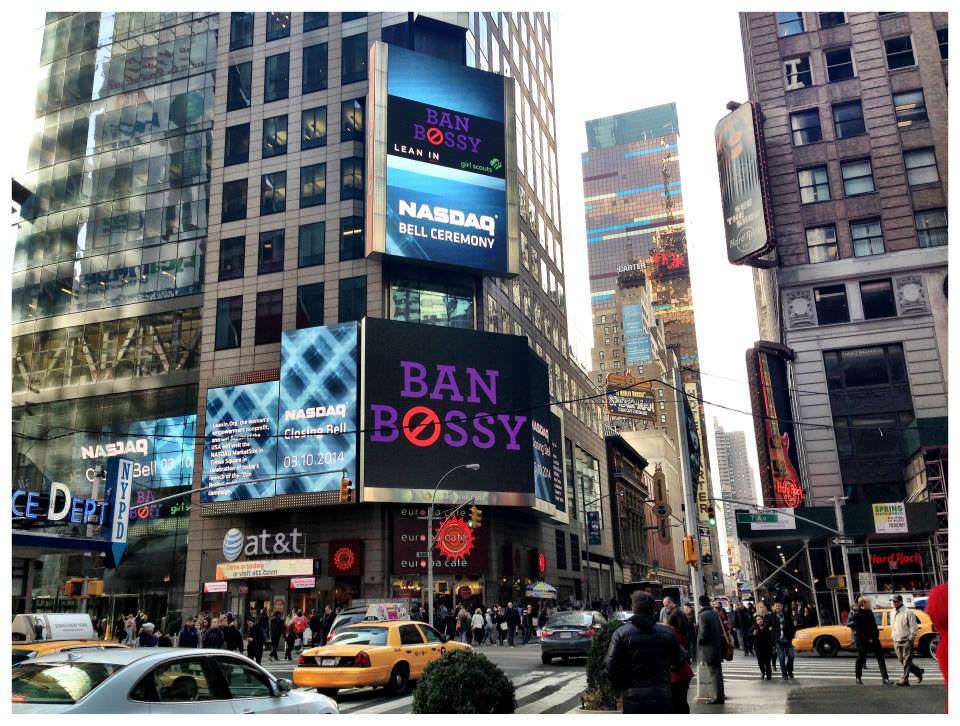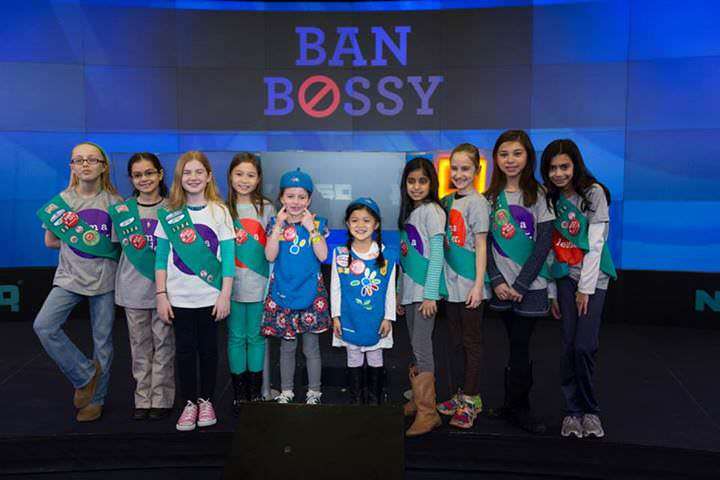'Ban Bossy': A Bad Remedy for a Fictional Problem
Using girls as props for activism that schools them in invented victimhood is not feminist advocacy, it's feminist malpractice.


The War on Bossy, led by Facebook boss Sheryl Sandberg, has been roundly criticized and even lampooned from left, right, and center. Sandberg's proposal to banish "the other B-word" because it's a common and damaging putdown for assertive girls has met with various objections, from "Why not teach girls to be bossy?" to "Why not teach both girls and boys not to be bossy?" to "Why not address real sexist barriers instead of playing language cops?" But the campaign has its supporters too, including famous ones such as singer Beyoncé Knowles and pundit Arianna Huffington. And now there is a backlash against the backlash, with some saying that "Ban Bossy" is based on real evidence both of the word's sexist use and of a still-strong, pervasive negativity toward female leadership.
Real evidence? Not so fast. A closer look at the research invoked by "Ban Bossy" defenders shows it to be shaky and selective. What's more, the "facts" cited on the campaign's own website are such a collection of abused data that it brings to mind another common B-word—the crude synonym for bovine excrement.
Perhaps the most memorable and widely cited of the campaign's factoids is this:
"Girls are twice as likely as boys to worry that leadership roles will make them seem 'bossy.'"
A fact sheet refers to a 2008 study by the Girl Scouts Research Institute (Girl Scouts CEO Anna Maria Chavez is a co-leader of Sandberg's campaign). The study, "Change It Up! What Girls Say About Redefining Leadership," is based on a survey of about 2,500 girls and 1,500 boys eight to 17 years old.
Guess what the study found: Girls and boys were equally likely to say they wanted to be leaders. For both sexes, about 40 percent agreed with the statement "I want to be a leader." A little over half picked "I don't mind being a leader, but it's not that important to me," and fewer than 10 percent said they did not want to be leaders. Girls and boys were also equally likely to say that "I think of myself as a leader" (61 percent) and to see themselves as smart, talented, and strong. And girls were more likely to see themselves as "responsible" (40 percent vs. 35 percent), "highly motivated" (31 percent vs. 27 percent), "passionate about something" (47 percent vs. 38 percent), and "creative" (50 percent vs. 39 percent).
So what's this about girls being twice as likely to worry that leadership roles would make them seem bossy? Well, the children who said they did not want to be leaders—again, fewer than one tenth of the total—were asked about the reasons for this lack of interest. In this small subsample, 29 percent of the girls and 13 percent of the boys agreed with the statement, "I do not want to seem bossy." That's about 2.5 percent of all girls, compared to just over one percent of boys. Truly, a dreadful scourge of future womanhood that calls for a massive social media campaign.
The Girls Scouts study has other fascinating data about girls and leadership. For instance, girls are somewhat more likely than boys to have actual leadership experience (in every area except sports, where 18 percent of boys and 14 percent of girls had been a captain or co-captain of a team). Thus, 31 percent of girls versus 26 percent of boys reported having been the leader of a team for a school project; 13 percent of girls, compared to 10 percent of boys, had run for a school or class office; and 11 percent of girls but only six percent of boys had been officers in a school club. This fits with what a number of social critics such as Christina Hoff Sommers have been arguing for a while: that right now, boys are the ones falling behind in schools, academically and socially.
Another alarming "fact" from the "Ban Bossy" site:
"The confidence gap starts early. Between elementary and high school, girls' self–esteem drops 3.5 times more than boys.'"
The source for this is a 1991 study from the American Association of University Women, "Shortchanging Girls, Shortchanging America," that amounts to 23-year-old junk science. Writing on the Psychology Today website in 2010, the late Susan Noelen-Hoeksma, a leading psychologist and a Yale University Professor, noted that "the study by the American Association of University Women was refuted by subsequent studies using large samples and better measures of self-esteem." After reviewing the claims of a crisis in girls' self-esteem and the relevant research, Noelen-Hoeksma concluded, "The phrase 'much ado about nothing' comes to mind."
And one more factoid:
"By middle school, girls are 25 percent less likely than boys to say they like taking the lead."
This turns out to be based on a study that tracked a large group of adolescents from 1992 to 1997. Seventy-two percent of sixth-grade boys but 54 percent of girls agreed with the statement, "I like to take the lead when a group does things together." But is this correlated with the kind of leadership that translates into achievement? Is the gap partly a result of the fact that girls are more likely than boys to interact with friends one-on-one, rather than in groups? Is this replicated in other research? Don't expect answers from "Ban Bossy."
Ashe Snow, a columnist for The Washington Examiner, contacted the study's author and learned that the question was only asked only once over the course of the study, so the wording which implies that girls become more leadership-averse as they get older is misleading. ("Change It Up" demonstrated the opposite.) Snow also demonstrates that another "Ban Bossy" claim—that "parents place a higher value on leadership for boys than for girls"—is based on a single statistic cherry-picked from a survey which, overall, shows that parents value leadership equally for their sons and daughters.

What about the sexist use of the word bossy? In The New Republic, Alice Robb points to recent research by several linguists who say that the word is disproportionately aimed at women and girls. In one text database search, the phrase "he is bossy" appears 131 times; "she is bossy," 210 times (which falls far short of claims that the term is virtually gender-specific). In another analysis of random samples from various media, the word was used for women or girls almost three times as often as for men or boys.
But text searches can yield complex and contradictory results. In my own simple Google search, I got an estimated 245,000 hits for "he is bossy" and 152,000 for "she is bossy." "He is too bossy" yields about 139,000 results; "she is too bossy," 145,000.
On the other hand, "My sister is bossy" gets about twice as many hits as "My brother is bossy" (20,400 to 10,000). "My daughter is bossy" gets nearly 35,000 hits compared to just 700 for "my son is bossy." But a lot of the results for the former are references to the "Ban Bossy" campaign. Oddly enough, "bossy little boy" gets over 200,000 hits compared to just 92,000 for "bossy little girl."
A few other qualifiers are needed. "Bossy" is not always pejorative; in fact, two of the four textual examples offered by one of the linguists whose work Robb cites for support are either positive or neutral. A relationship advice site for women features an article titled, "How to be Bossy in Love without being Bitchy." My search for "bossy little girl" in Google Books yielded such items as the children's book, Christmas with Rita and Whatsit, the summary for which describes its characters as "an irresistible new duo: Rita, a determined, rather cross and bossy little girl" and her dog. All About April, a collection by "For Better or Worse" cartoonist Lynne Johnston, features a poem about her daughter which includes the lines, "Bold and sassy, cute and short,/Bossy little girl." And there is, of course, comedienne Tina Fey's humorous autobiography, Bossypants.
Conversely, the word can and does get used as a pejorative for men. One blogger dug up forty instances of Mitt Romney being called "bossy" during the 2012 campaign—not in a flattering way. And in my own Google search, I came across an article titled "The Drama With Bossy Bosses," illustrated with a photo of a finger-pointing male boss wearing a pig mask.
One may also ask if "bossy" boys—and men—are sometimes called more pejorative terms than "bossy." "Jerk," for instance, is used almost exclusively toward men. "My son is a bully" yields 264,000 Google hits compared to 127,000 for "my daughter is a bully."
Sandberg's campaign is ostensibly meant to empower little girls and young women. But promoting myths of silenced, discouraged girls promotes grievance, division, and insecurity instead of empowerment—while downplaying boys' problems.
One "Ban Bossy" video starts out with several young girls talking about their dreams and ambitions. Then, the same girls are shown saying, "Here is where I will start to doubt myself." "Here is where I will start being interrupted." "Here is where I will stop raising my hand." "Here is where my voice will get drowned out." "Here's where I was called stubborn … pushy … know-it-all … aggressive … bossy." Did those girls, who did not look like they were lacking in confidence, ever get any serious discouraging messages before they were selected to appear in the video?
Using children as props for adult activism is always a dubious proposition. Using girls as props for activism that schools them in invented victimhood is not feminist advocacy, it's feminist malpractice.
This article originally appeared at RealClearPolitics.


Show Comments (139)